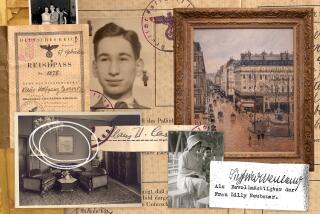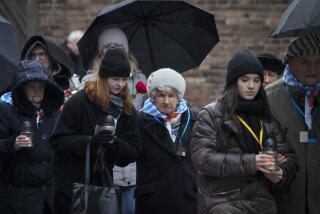Germany wonders: Will Wagner archives expose Nazi links?

BERLIN — Family archives belonging to a descendant of the composer Richard Wagner are expected to be passed to the German government soon, opening access to researchers who have long sought to shed light on their links to the Nazi regime.
With the 200th anniversary of Wagner’s birth coming Wednesday, the composer’s great-granddaughter, Katharina Wagner, pledged the “prompt” release of family letters. He was born May 22, 1813.
Although the contents of the letters are unknown, their release raises the prospect of revelations about the degree to which the Wagners admired and colluded with the Nazis.
The letters belonged to Katharina’s father, the late Wolfgang Wagner, a former member of the Hitler Youth who ran the Bayreuth festival dedicated to the hallowed German composer from 1951 to 2008. He died in 2010.
During the Nazi era, the festival was run by Wolfgang’s British-born mother, Winifred, who was a close friend of Hitler’s. Several Jewish musicians who performed at Bayreuth were murdered by the Nazis, including the soprano Henriette Gottlieb, who died in the Lodz ghetto in occupied Poland in 1942.
In an interview with Der Tagesspiegel published Sunday, Katharina Wagner said she rarely spoke with her father about the Nazi period. “I only knew that my father did not approve of his mother’s entanglements. I noticed that it weighed heavily on him emotionally and so I did not pester him.”
She said his letters would be handed to the Bavarian state archive to allow researchers access.
Katharina and her half-sister, Eva Wagner-Pasquier, have promised greater transparency before but have not taken concrete steps toward providing open access. Only last week, a leading German historian of the Nazi era, Hannes Heer, complained that he had been denied access to the Wolfgang Wagner estate.
Katharina Wagner acknowledged this in her interview Sunday, saying: “Despite intensive efforts it was not possible to arrange contact at the right time. Therefore Mr. Heer could not get access, which he justifiably complained about.”
Handing the archive to the government should ensure that independent researchers are able to scrutinize the letters.
When the Vienna Philharmonic opened its files this year, it emerged that the orchestra’s management continued to venerate the Nazis even after the war, presenting a “ring of honor” to the former Nazi governor of Vienna in the late 1960s after he was released from prison. A trumpeter in the Vienna Philharmonic was a member of the SS who denounced fellow musicians to the Nazis.
In her interview, Katharina Wagner said that in 2010 she had asked a historian and a journalist to go through her father’s archive for matters relevant to the Nazi period. The results of the inquiry have never been made public.
Earlier this month, there was a fresh reminder of the controversy Wagner can provoke when a Nazi-themed production of his opera “Tannhaeuser” was canceled. The production in Dusseldorf will continue in concert form but without the references to gas chambers, Nazi-style uniforms and the execution scene, which left some audience members requiring medical treatment for shock.
Wagner’s legacy touches on a central question here: whether Germany’s sophisticated culture contained within it the seeds of its 20th century descent into barbarity. The composer’s 1850 essay, “Das Judenthum in der Musik” (“Judaism in Music”), notoriously calls for the “selbstvernichtung” — self-destruction — of the Jews.
Wagner’s music was regularly used to soundtrack key moments in Nazi propaganda. “The Ride of the Valkyries” was used in newsreels to accompany footage of air attacks, while a passage from “Die Meistersinger” is played in the Leni Riefenstahl film “Triumph of the Will.”
Wolfgang Wagner favored minimal stagings of his grandfather’s operas, effectively stripping away associations with Germanic myth-making to emphasize the music.
Heer, the historian, said in an interview last week that there were still “huge gaps” in the Wagner clan’s historical record.
“The facts must come out about the negative role of Richard Wagner and his heirs,” the historian told the Bavarian newspaper Der Suedkurier.
Correspondence between Hitler and Winifred Wagner is held by a family member who belongs to a separate branch of the family from Katharina Wagner. The family has not yet reached agreement on the release of these letters.
ALSO:
French president signs law allowing same-sex marriageItalian court told about Berlusconi’s ‘bunga bunga’ parties
Cancellation of Nazi-flavored ‘Tannhauser’ shocks its director
More to Read
Start your day right
Sign up for Essential California for news, features and recommendations from the L.A. Times and beyond in your inbox six days a week.
You may occasionally receive promotional content from the Los Angeles Times.






